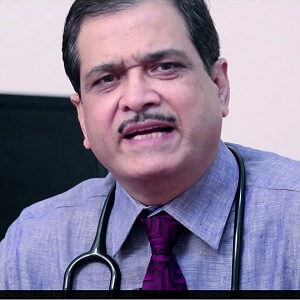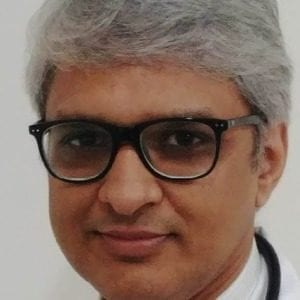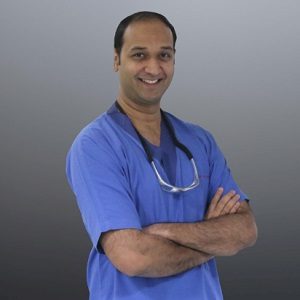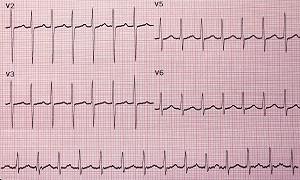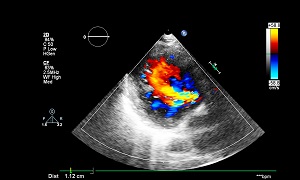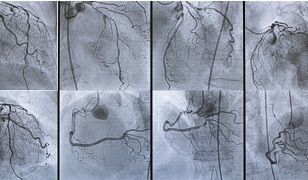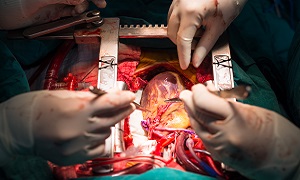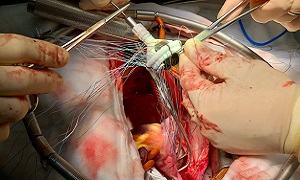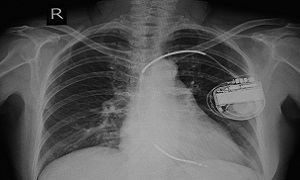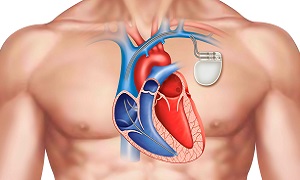Best Doctors in India for Congestive Heart Failure treatment
- Top Interventional Cardiologist | Apollo Hospital, New Delhi, India
- 26+ Years Experience
- Indraprastha Apollo Hospital, New Delhi
Profile Highlights:
- Dr. Rajeev Kumar Rajput is one of the best Cardiologists in India with nearly 23 years of experience. He is a clinical cardiologist engaged in diagnosing and treating cardiovascular diseases.
- Dr. Rajput is currently working as a senior consultant with Indraprastha Apollo Hospitals, New Delhi, and also offers patient care at the Heart & Gynae Clinic.
- Dr. Rajeev Kumar Rajput specializes in Angiography and Interventional Cardiology. The treatments provided involve Neonatal and Infant cardiac surgeries, Device Closure, and Valve replacement. He has expertise in Aortic Aneurysm Surgery, Vascular Surgery, Percutaneous Coronary Interventions, Endovascular Repair, Cardiac Catheterisation, Open Heart Surgery, and MV replacement.
- Dr. Rajput is credited with publishing several papers in noted medical journals.
- Cardiologist, Gurugram, India
- Over 20 years’ experience
Profile Highlights:
- Dr. Vivek Chaturvedi is a highly experienced and acclaimed cardiologist with over 20 years of experience.
- He has performed more than 2500 cardiac ablations, several of them for complex arrhythmias like atrial tachycardia, ventricular tachycardia, VPC, and atrial fibrillation using the latest technology like 3D Electroanatomic mapping.
- He has more than 50 publications in international journals & books.
- Interventional Cardiologist, Chennai, India
- Over 15 years’ experience
- Apollo Hospitals Greams Road
Profile Highlights:
- Dr. Sai Satish is a distinguished Senior Interventional Cardiologist affiliated with Apollo Hospitals in India, renowned for his pioneering contributions to the field of transcatheter valve therapies.
- His expertise extends internationally, as he also serves as a practicing interventional cardiologist and esteemed faculty member at the Gottsegen Institute of Cardiology in Budapest, Hungary, one of the world’s leading centers for TAVR (transcatheter aortic valve replacement) training.
- A trailblazer in the realm of minimally invasive cardiovascular procedures, Dr. Satish is celebrated for performing the highest number of percutaneous edge-to-edge mitral repairs (MitraClip implants) in the Indian subcontinent.
Best Hospitals in India for Congestive Heart Failure treatment
- City: New Delhi, India
Hospital Highlights:
- Over the last 33 years, the Fortis Escorts Heart Institute has set new standards in cardiac treatment with groundbreaking research. It is now known around the world as a centre of expertise for Cardiac Bypass Surgery, Interventional Cardiology, Non-invasive Cardiology, Paediatric Cardiology, and Paediatric Cardiac Surgery.
- The hospital has cutting-edge laboratories that perform a wide range of diagnostic tests in Nuclear Medicine, Radiology, Biochemistry, Haematology, Transfusion Medicine, and Microbiology.
- Fortis Escorts Heart Institute boasts a diverse group of bright and experienced doctors who are backed up by a team of highly qualified, experienced, and devoted support professionals as well as cutting-edge equipment such as the recently installed Dual CT Scan.
- Approximately 200 cardiac doctors and 1600 personnel currently collaborate to manage over 14,500 admissions and 7,200 emergency situations each year. The hospital now has a 310-bed infrastructure, as well as five cath labs and a slew of other world-class amenities.
- City: Faridabad
Hospital Highlights:
In the sprawling city of Faridabad, where healthcare needs are diverse and ever-evolving, one institution has consistently stood out as a beacon of excellence in the field of medicine—Marengo Asia Hospital. Established with a vision to provide world-class healthcare services to the community it serves, Marengo Asia Hospital has emerged as a trusted name synonymous with quality, compassion, and innovation in healthcare.
- City: New Delhi, India
Hospital Highlights:
- Equipped with 650 beds, BLK-Max Super Speciality Hospital is the largest stand-alone private sector hospital in Delhi.
- With over 1500 healthcare providers and 150 globally renowned super specialists, the hospital is one of Asia’s largest BMT Centres. The hospital is known for having some of the best cancer doctors in the country.
- The hospital is NABH and NABL accredited and was inaugurated by the first Prime Minister of India. Pt. Jawahar Lal Nehru.
- City: Chennai, India
Hospital Highlights:
- Located in Chennai, India, MGM Healthcare is a top multispecialty hospital that provides all medical services under one roof.
- Since its founding in 2019, MGM Healthcare has quickly become a leading national referral centre, creating several innovative flagship initiatives.
- MGM Healthcare combines next-generation medical and digital technologies to provide better patient results.
- With 12 centres of excellence, more than 400 inpatient beds, 100 intensive care unit beds, and 24/7 emergency care, MGM Healthcare leaves no chance in redefining the patient experience in Chennai.
- MGM Healthcare boasts 250+ expert doctors across 30+ departments, including Cardiology, Pulmonology, Neurology, Obstetrics & Gynaecology, and more.
- They house 12 specialized Centres of Excellence, including Neurosciences, Orthopaedics, and Multi-Organ Transplantation.
- Their team of doctors, nurses, and paramedics works together to give every patient individualized treatment.
- City: Noida, India
Hospital Highlights:
- Fortis Hospital, Noida, stands as one of the oldest and most trusted healthcare institutions in the region, setting a benchmark for comprehensive medical care.
- As the second mega hub hospital in the Fortis Healthcare Group, Fortis Hospital, Noida, upholds a legacy of trust among more than 1.2 million patients. By integrating top-tier professionals with cutting-edge technology, the hospital delivers superior treatment across various medical disciplines.
- Specializing in advanced Neurosciences, Orthopedics, Kidney and Liver Transplant Programmes, Fortis Hospital, Noida has successfully performed over 1,500 transplants, solidifying its reputation as a leader in specialized medical interventions.
Congestive Heart Failure
Congestive heart failure is a progressive condition affecting the pumping of blood. It occurs when the muscles of your heart fail to pump blood efficiently. This is mainly because of certain conditions like coronary artery disease (narrowing of arteries in your heart) and high blood pressure that weaken your heart. This results in inefficient filling of blood in your heart and pumping further.
Types of Heart Failure
- Left-sided Heart Failure – There is shortness of breath as the fluid backs up in the lungs.
- Right-sided Heart Failure – There is swelling because the fluid backs up into the legs, feet, and abdomen.
- Systolic Heart Failure – There is a pumping problem as the left ventricle cannot contract vigorously.
- Diastolic Heart Failure – Also known as heart failure with preserved ejection fraction, the left ventricle cannot fill fully or relax fully in this condition. This indicates a filling problem.
Causes of Congestive Heart Failure
When other conditions damage or weaken your heart, you may experience Heart Failure. This can also occur due to the stiffness of the heart. The ventricles (main pumping chambers of your heart) become stiff and don’t fill properly between the beats causing heart failure. In some cases of Heart Failure, there are weakened and damaged heart muscles. Due to this, the ventricles dilate (stretch) up to a point that the heart fails to pump blood efficiently throughout your body.
With the passage of time, the heart fails to fulfil the demands of pumping blood to the entire body. An ejection fraction helps to determine the pumping capacity of your heart while helping to identify Heart Failure for appropriate treatment. If the heart muscle becomes stiff due to high blood pressure, it may result in Heart Failure.
- High Blood Pressure or Hypertension- If you are suffering from hypertension, then your heart needs to work strenuously for circulating the blood throughout the body. This makes the heart muscles either stiff or weak for efficient pumping of blood.
- Cardiomyopathy- Also called the heart muscle damage, it has causes like infections, the toxic effect of drugs, diseases, alcohol abuse, and genetic factors.
- Coronary artery disease- It is a common form of heart disease and a common cause of heart failure. It occurs due to the buildup of plaque (fatty deposits) in your arteries. This reduces the flow of the blood causing heart attack.
- Congenital heart defects- These are the heart defects you are born with. If the chambers and valves of your heart don’t form correctly, the heart needs to work harder for pumping blood. This may cause Heart Failure.
- Faulty heart valves- The valves of the heart maintain the blood flow in a proper direction through your heart. Coronary artery disease, heart defects, or heart infection may damage the valve of your heart. This again forces your heart to work strenuously and weaken it with the passage of time.
- Heart arrhythmia– Also called the abnormal heart rhythm, it causes faster beating of your heart and creates extra work for it. However, Heart Failure may also take place due to slow heartbeats.
- Myocarditis- It is an inflammation of the muscles of the heart. Most of the viruses cause myocarditis which ultimately leads to left-sided Heart Failure.
- Other diseases- Chronic diseases like HIV, hypothyroidism, diabetes, hemochromatosis (buildup of iron), hyperthyroidism or amyloidosis (buildup of protein) may cause Heart Failure.
Symptoms of Congestive Heart Failure
- Edema (or swelling) in your legs, feet, and ankles
- Ascites or swelling of your abdomen
- Dyspnea or shortness of breath upon lying down or normally
- Reduced ability to exercise
- Nausea
- Weakness
- Persistent coughing or wheezing with blood-tinged phlegm
- Lack of appetite
- Fatigue
- Decreased alertness or difficulty in concentrating
- Irregular or rapid heartbeat
- Coughing up foamy, pink mucus
- Chest pain
- Increased urination during the night time
- Sudden and severe shortness of breath
Diagnosis of Congestive Heart Failure
Your doctor will note down a careful medical history, perform a physical examination, and review your symptoms to diagnose Heart Failure. Your doctor might check for risk factors like diabetes, blood pressure, and coronary artery disease. He or she might check for congestion in the lungs with the help of a stethoscope. This also helps in detecting abnormal heart sounds indicating Heart Failure. He or she will also check for fluid buildup in your legs and abdomen.
Blood tests
Electrocardiogram
Chest X-ray
Echocardiogram
Stress test
Stress test measures your heart’s health by evaluating the response of the heart to exertion. Your doctor might ask you to walk on a treadmill while an ECG machine is attached. Sometimes, the test is done wearing a mask that measures the ability of your lungs and heart to take in oxygen while breathing out carbon dioxide. Your doctor might use imaging techniques to visualize the heart while the test is on.
Magnetic Resonance Imaging
Computerized Tomography Scan
Myocardial Biopsy
Coronary Angiogram
Treatment options for Congestive Heart Failure
Medications
- Angiotensin-converting enzyme inhibitors: ACE inhibitors help people with systolic Heart Failure feel better. They are vasodilators and widen the blood vessels to reduce blood pressure. This improves the blood flow and decreases the workload on the heart.
- Angiotensin II receptor blockers: They have benefits similar to the ACE inhibitors and are an alternative for the people who can’t tolerate ACE inhibitors.
- Beta-blockers: These drugs slow down the heart rate and reduce blood pressure. This helps in limiting or reversing the damage to your heart if you have systolic Heart Failure. They reduce the risk of abnormal heart rhythms and improve heart function.
- Diuretics: These drugs make you urinate frequently and prevent the collection of fluids in your body. They also decrease fluid in the lungs for better breathing.
- Aldosterone antagonists: They help people with systolic Heart Failure to live longer.
- Inotropes: Your doctor will prescribe these drugs if you had severe Heart Failure to improve the pumping function of the heart and maintain the blood pressure.
Surgery and medical devices
Coronary bypass surgery
Heart valve repair
Implantable cardioverter-defibrillators
Cardiac Resynchronization Therapy
Palliative care


